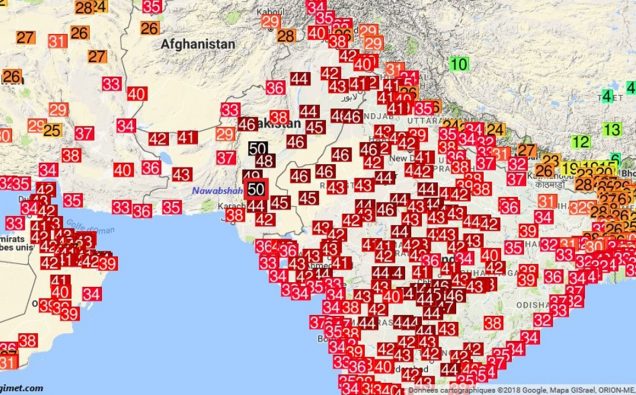
A map showing sizzling temperatures over Pakistan and India on Monday, in Celsius. (ogimet.com via @EKMeteo on Twitter)
Another climate change warning hit the world this week when Nawabshah, a southern Pakistan city, recorded what many experts believe to be the hottest temperature for the month of April.
The mercury rocketed to 50.2° Celsius Nawabshah on Monday, the last day of April 2018, and this is just the start of summer on desert plains.
A meteorologist at Meteo France, Etienne Kapikian reported on Twitter that the 50 degrees Celsius reading may be the highest ever recorded temperature on earth for the month of April.
Pakistan Meteorological Department (PMD) Director General Dr Ghulam Rasool confirmed to the media that the temperature in Nawabshah on Monday (April 30) was the highest ever recorded in Pakistan for April.
However, Ghulam Rasool said he could not comment either way on the world temperatures record.
Temperatures hit more than 50 degrees Celsius. And it's not even summer yet.
Learn more about the effect climate change may have on global temperatures: https://t.co/GfTgiPS0l7 pic.twitter.com/F7IEUwBwyU
— World Economic Forum (@wef) May 3, 2018
The Washington Post quotes Christopher Burt, an expert on global weather extremes, as saying that the simmering mercury level was probably also the highest temperature “yet reliably observed on Earth in modern records.”
The competing hottest April temperature of 51.0° Celsius set in Santa Rosa, Mexico, in April 2001, is “of dubious reliability,” Burt added.
April marked the second straight month during which Nawabshah registered a new monthly temperature record for Pakistan.
The news has sent out alarm bells ringing among climate change and global warming experts across the world, as the last century’s record highs and the last decades temperature horror sheet repeats warning after warning.
According to the UN, South Asia is one of the regions that might witness mass migrations due to climate change in the decades to come. During the last ten years, South Asia has had massive floods, earthquakes, extremely hot summers and droughts.
![Projected change in annual mean surface air temperature from the late 20th century to the middle 21st century, based on a medium emissions scenario (SRES A1B).[130] This scenario assumes that no future policies are adopted to limit greenhouse gas emissions. Image credit: NOAA GFDL.[131] By NOAA Geophysical Fluid Dynamics Laboratory (GFDL) - Edited from Very High Resolution Version 3200 x 1901 png (693KB), in: NOAA GFDL Climate Research Highlights Image Gallery: Patterns of Greenhouse Warming, publisher: NOAA GFDL. Retrieved 2012-10-13., Public Domain, https://commons.wikimedia.org/w/index.php?curid=22038066](https://upload.wikimedia.org/wikipedia/commons/e/e6/Projected_change_in_annual_mean_surface_air_temperature_from_the_late_20th_century_to_the_middle_21st_century%2C_based_on_SRES_emissions_scenario_A1B.png)
Projected change in annual mean surface air temperature from the late 20th century to the middle 21st century, based on a medium emissions scenario (SRES A1B).[130] This scenario assumes that no future policies are adopted to limit greenhouse gas emissions. Image credit: NOAA GFDL.[131] By NOAA Geophysical Fluid Dynamics Laboratory (GFDL) – Edited from Very High Resolution Version 3200 x 1901 png (693KB), in: NOAA GFDL Climate Research Highlights Image Gallery: Patterns of Greenhouse Warming, publisher: NOAA GFDL. Retrieved 2012-10-13., Public Domain, https://commons.wikimedia.org/w/index.php?curid=22038066
“We usually have per acre yield of 45 maunds (maund=37 kilograms) but this year , the yield is just 30 maunds , mainly due to early advent of summer,” says Abid Hussain, a wheat grower in central Punjab district of Sheikhupura.


















